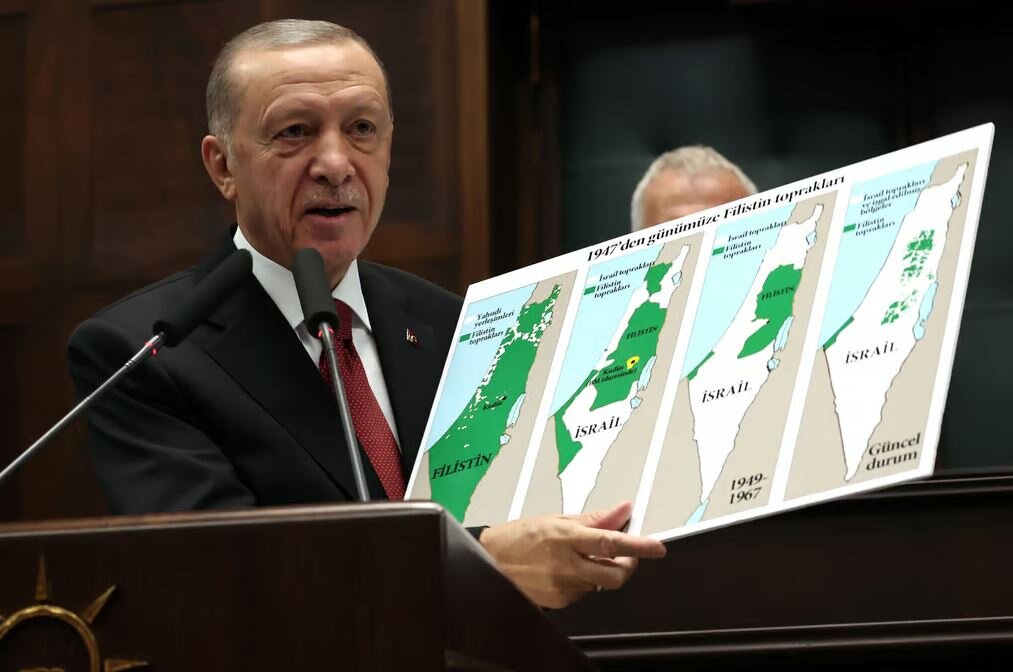Turkey’s support for Gaza heartwarming, but nowhere near enough

TEHRAN – While Turkey was the world’s first Muslim country to recognize Israel as a “state”, it has concurrently maintained a pro-Palestine rhetoric for much of its 74 years of ties with the regime.
Turkey and Israel’s relations took a hit in 2009 when then-Prime Minister Recep Tayyip Erdogan disrupted Israeli Prime Minister Shimon Peres' speech at the Davos Summit of the World Economic Forum with a stern: "One minute," followed by the watershed statement, "You know very well how to kill. I know very well how you kill children on the beaches," before abruptly leaving the stage.
But even during the two’s most tumultuous days, Turkey’s economic and trade partnerships with the regime stayed largely intact.
Now, history seems to be repeating itself. On November 11, Turkish President Erdogan addressed Israel's latest onslaughts against the Gaza Strip during a speech at his country’s parliament, calling the regime a “terror state” before asking for an investigation into its war crimes.
Erdogan’s remarks prompted Israel to call back its diplomats from Ankara, but they once again failed to affect the extensive trade partnership between the two sides.
Israel is one of Turkey’s biggest economic partners in West Asia. It contributed to a bilateral trade volume of over $8.9 billion in 2022.
For quite some time, Turkey's expanding commercial relations with Israel seemed to get overshadowed by its growing vocal support for Palestine. However, the latest Israeli war against Gaza has intensified criticism concerning Ankara's untrammeled economic collaboration with Tel Aviv.
A photo showing a substantial quantity of renowned Turkish coffee packs being distributed to Israeli forces sparked widespread controversy on social media last month. People called for the boycott of Mehmet Efendi’s products while slamming the Turkish government for continuing its shipments to the occupied territories.
Some Turkish politicians have also turned the screw on the state and spearheaded the demand for Ankara to halt shipments to Israel. "Shame on you for providing the food and fuel used by Israeli soldiers," former Turkish Foreign Minister Ahmet Davutoglu voiced on X, formerly known as Twitter.
A prominent member of Turkey’s Felicity Party also took a harsh stance against the country’s longstanding commercial ties with Israel, accusing Erdogan of “complicity in the murder of Palestinian children”.
Turkey is a key oil supplier for Israel. Reports show that an oil tanker registered in Malta transported 1 million barrels of Azerbaijani crude from Turkey’s Ceyhan Port to Israel’s Eilat Port in late October. The Baku–Tbilisi–Ceyhan pipeline supplies around 40 percent of Israel’s annual oil consumption. Activists and politicians around the Muslim world believe closing this pipeline could deal a heavy blow to Israel amid its killing campaign in Gaza.
Also, Israelis continue to gobble up food that’s made from agricultural produce imported from Turkey. No Turkish official has yet signaled that shipments to Israel would be stopped, or at least limited, in response to its mass slaughter of Palestinians in the besieged Gaza Strip.
Why Can’t Turkey draw a line?
Erdogan is continuing with his rhetoric against Israel. He has so far described Hamas as a liberation movement and hit back at Israeli Prime Minister Benjamin Netanyahu, calling him the “Butcher of Gaza”. But in contrast to his harsh words, the actions Erdogan can take to pile up pressure on Israel remain notably cautious.
“Turkey is a NATO member and it has close relations with Washington. Though the Turkish President has tried to acquire independent foreign policies in the past two decades, the truth of the matter is that Ankara has always had to be weary of Washington’s response,” Shoaib Bahman, the head of the Institute of Contemporary International Studies in Tehran told the Tehran Times. “Sadly, Turkey’s words and actions do not match. Nobody can deny that while Ankara continues to criticize the Israeli regime, it has not been able to take many concrete steps to help the Palestinians.”
There are more countries in West Asia that have condemned Israel’s killings in Gaza but continued to maintain ties with the regime. Saudi Arabia, for instance, has reportedly told the White House that it will resume normalization talks with Israel once the Gaza war comes to an end. But people perhaps expect more from Turkey in comparison to Arab states. That’s because for a long while after Erdogan’s remarks at the 2009 Davos Summit, Turkey and in particular the AK party were regarded as one of the biggest supporters of the Palestinian cause.
Erdogan was even made a pro-Palestinian icon a year after the incident, when in 2010 a Turkish flotilla attempted to break through Israel’s blockade of Gaza and deliver aid to the Strip.
The expectation seems to persist even in 2023. The former head of the Palestinian Hamas resistance movement Khaled Mashaal who has held meetings with Erdogan several times over the past years, expressed his “great respect for Turkey” a week after Operation Al-Aqsa Storm, saying he expects Ankara to ask Israel to “stop” its attacks on Gaza.
“Turkey seeks to portray itself as the leader of the Islamic world. Being a member of NATO and having extensive commercial relations with Israel are not in favor of such desire,” Bahman added.
By Mona Hojat Ansari
Culled from Tehran Times

